Journal
-
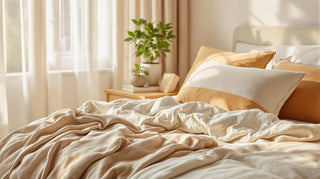
Top 7 Hypoallergenic Bedding Materials
Key Materials: Bamboo: Naturally antimicrobial, moisture-wicking, eco-friendly, and soft. Silk: Smooth, tightly woven, resists dust mites, and regulates temperature. Tencel: Eco-conscious, moisture-absorbing, and gentle on sensitive skin. Organic Cotton: Chemical-free,...
-
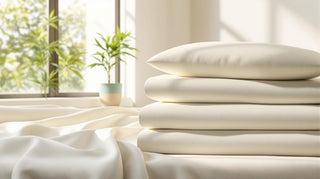
How to Wash Bamboo Sheets for Allergy Protection
Want to keep your bamboo sheets allergen-free and long-lasting? Here's how: Wash every 1-2 weeks to minimize allergens like dust mites and pollen. Use cold water, a gentle cycle, and...
-

Guide to Sustainable Bedding for Allergy Relief
Sustainable bedding made from materials like bamboo and organic cotton can help reduce allergens such as dust mites, mold, and pet dander while being eco-friendly. These fabrics are naturally hypoallergenic,...
-

Bamboo vs. Organic Cotton: Best for Air Quality
If you're looking to improve air quality in your bedroom, bamboo and organic cotton bedding are two excellent choices. Both materials are hypoallergenic, non-toxic, and support healthier sleep. Here's a...
-

What Makes Bamboo Sheets Moisture-Wicking
Bamboo sheets are known for their ability to keep you cool, dry, and comfortable while you sleep. Here's why: Moisture-Wicking: Bamboo fibers absorb up to 3x their weight in moisture,...
-

Luxury Bamboo Bedding for Sensitive Skin
Bamboo bedding is a game-changer for sensitive skin. Its hypoallergenic, antimicrobial, and moisture-wicking properties create a clean, soothing sleep environment. Plus, bamboo's temperature regulation and ultra-soft texture help reduce irritation,...
-

Checklist for Minimalist Sustainable Bedding
Eco-friendly bedding isn’t just about comfort - it’s about making choices that are good for your health and the environment. By choosing materials like bamboo lyocell, TENCEL eucalyptus, organic cotton,...
-
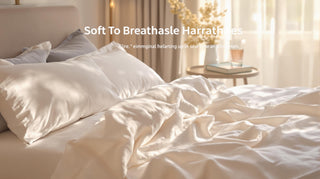
The Science Behind Breathable Fabrics and Sleep
Breathable fabrics can improve your sleep by regulating temperature, managing moisture, and enhancing airflow. Here's what you need to know: Temperature Control: Natural fibers like linen and cotton help maintain...
-
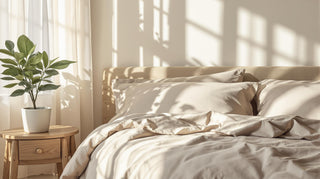
Ultimate Guide to Non-Toxic Bedding for a Healthier Home
Non-toxic bedding is essential for better sleep and health. It avoids harmful chemicals, improves air quality, and supports eco-friendly practices. Here's what you need to know: Best Materials: Organic cotton...
-

6 Ways to Make Your Bedding Last Longer
Want your bedding to last longer while staying soft and comfortable? Follow these six simple tips to protect your investment and reduce waste: Rotate Bedding: Switch between sets weekly or...
-
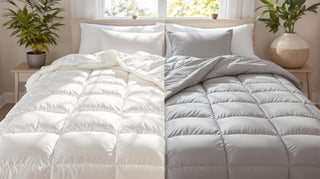
Down vs Alternative Down: Comparing Quilt Materials
Choosing between down and alternative down quilts depends on your priorities like warmth, allergies, maintenance, and budget. Here’s a quick breakdown: Down Quilts: Lightweight, excellent insulation, breathable, durable, but expensive...
-
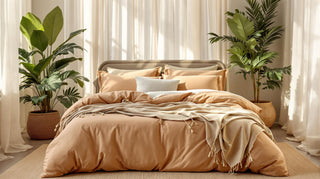
Top 8 Eco-Friendly Bedding Materials for 2025
Key Takeaways: Bamboo: Minimal water use, antibacterial, hypoallergenic, and durable. Organic Cotton: Chemical-free, uses 71% less water than regular cotton, and breathable. Tencel: Made from eucalyptus, low carbon footprint, moisture-wicking,...












